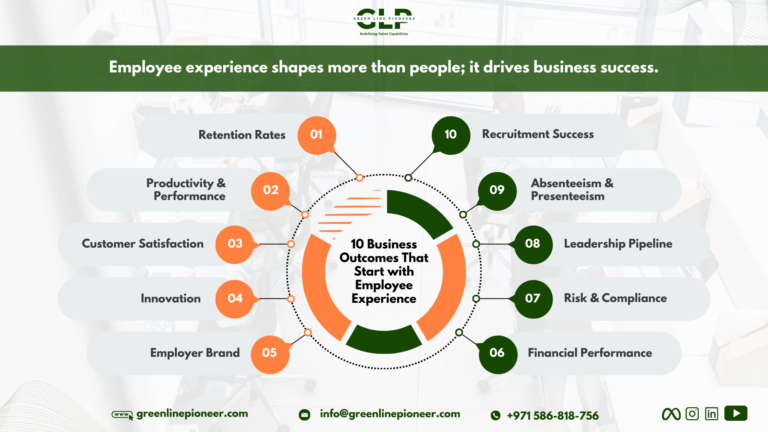10 Business Outcomes Driven by Employee Experience
Employee experience is no longer just an internal HR focus—it is the foundation of sustainable business success. The way employees feel, interact, and contribute within the workplace directly shapes retention, productivity, customer relationships, innovation, and ultimately financial growth. Organizations that prioritize employee experience don’t just create better workplaces; they create stronger businesses.
In this article, we will explore ten key business outcomes influenced by employee experience and why companies that invest in people achieve long-term results.
- Retention: Keeping Top Talent in the Organization
Retention is one of the most direct outcomes of employee experience. Employees who feel respected, recognized, and supported are far more likely to stay with their company.
High turnover is costly it disrupts workflows, increases recruitment expenses, and often damages team morale. On the other hand, organizations that foster a positive employee experience create loyalty. When people feel valued and connected to the company’s purpose, they choose to grow with the business rather than seeking opportunities elsewhere.
- Productivity: Driving Stronger Results
Employee experience has a direct link to productivity. An engaged workforce is not only more efficient but also more committed to delivering quality outcomes.
When employees feel motivated and understand how their work contributes to the bigger picture, they are less likely to waste time and more likely to find meaning in their tasks. A culture that supports collaboration, recognition, and personal development often sees higher levels of output and measurable business growth.
- Customer Satisfaction: Building Positive Experiences Beyond the Workplace
There is a clear connection between happy employees and satisfied customers. Employees who enjoy their work bring positivity and energy into every customer interaction, whether in sales, support, or service.
A workplace that values its people naturally translates that value to clients. Companies that prioritize employee experience see higher customer loyalty, repeat business, and stronger long-term relationships because their teams deliver authentic care and service.
- Innovation: Encouraging Creativity and New Ideas
Innovation thrives in workplaces where employees feel safe to share their ideas without fear of rejection. A healthy employee experience encourages open communication, experimentation, and problem-solving.
Organizations that create psychological safety where employees trust that their input matters see higher levels of innovation. From small process improvements to breakthrough product ideas, employee-driven innovation is a competitive advantage that can only emerge when the workplace culture supports creativity.
- Employer Brand: Shaping Reputation in the Market
A company’s culture doesn’t stay behind closed doors it defines how the business is perceived in the market. Word-of-mouth from current and former employees, reviews on platforms like Glassdoor, and industry reputation all form the employer brand.
A strong employer brand helps position the company as a desirable workplace. This reputation doesn’t just attract talent; it builds trust with clients, investors, and partners who prefer working with organizations that treat their employees well.
- Recruitment: Attracting the Right Talent
Recruitment becomes easier when employee experience is a priority. Potential hires actively research company culture before applying, and positive stories from employees can be the deciding factor.
When businesses demonstrate that they care for their people through career growth opportunities, supportive leadership, and a healthy work-life balance, they attract high-quality candidates who align with the company’s values.
Strong recruitment outcomes start with creating the kind of workplace people want to join.
- Absenteeism: Reducing Hidden Costs
Absenteeism is often overlooked, but it carries significant financial and operational costs. Poor workplace culture, stress, and disengagement frequently lead to higher levels of sick leave and unplanned absences.
A supportive employee experience where mental health, wellness, and balance are prioritized reduces absenteeism. When employees feel cared for, they are less likely to avoid work, resulting in more consistent performance and fewer disruptions to daily operations.
- Leadership: Developing the Next Generation of Leaders
Strong employee experiences not only improve day-to-day performance but also shape future leadership. Employees who feel supported and mentored are more likely to take on leadership responsibilities with confidence.
Organizations that create environments where employees can learn, grow, and lead see a natural pipeline of capable leaders emerging from within. These leaders carry forward the same positive culture, creating long-term continuity and stability in the organization.
- Compliance: Reducing Risks Through Engagement
When employees feel that their voices are heard and respected, they are more likely to follow policies, raise concerns, and participate in compliance-related activities.
A culture of transparency and trust ensures that employees actively contribute to workplace safety, ethical practices, and regulatory requirements. This reduces compliance risks, avoids legal challenges, and protects the company’s reputation in the market.
- Financial Performance: Strengthening the Bottom Line
Every people-related outcome retention, productivity, customer satisfaction, and innovation ultimately impacts financial performance.
Companies that invest in employee experience see measurable improvements in profitability. Lower turnover reduces costs, higher engagement increases revenue, and stronger customer relationships drive sustainable growth. Simply put, better employee experiences lead to stronger financial outcomes.
Why Employee Experience Matters More Than Ever
In today’s competitive landscape, organizations can no longer treat employee experience as an optional HR initiative. It is a business strategy that drives tangible results. From reducing hidden costs to improving brand reputation, the employee experience touches every part of a company’s performance.
At Green Line Pioneers, we work with businesses to design meaningful employee experiences that strengthen culture, support growth, and deliver measurable business outcomes. By aligning workplace strategies with business goals, we help organizations achieve long-term success.
Conclusion
Employee experience is not just about keeping employees happy—it is about driving business success at every level. Retention, productivity, customer satisfaction, innovation, and financial results all stem from how employees feel at work.
Organizations that prioritize a positive employee experience are not only more resilient but also better positioned for growth in a rapidly changing world. Investing in people is no longer optional it is the foundation of lasting business success.


Green Line Pioneers
Redefining Talent Capabilities
Explore us on Social Media